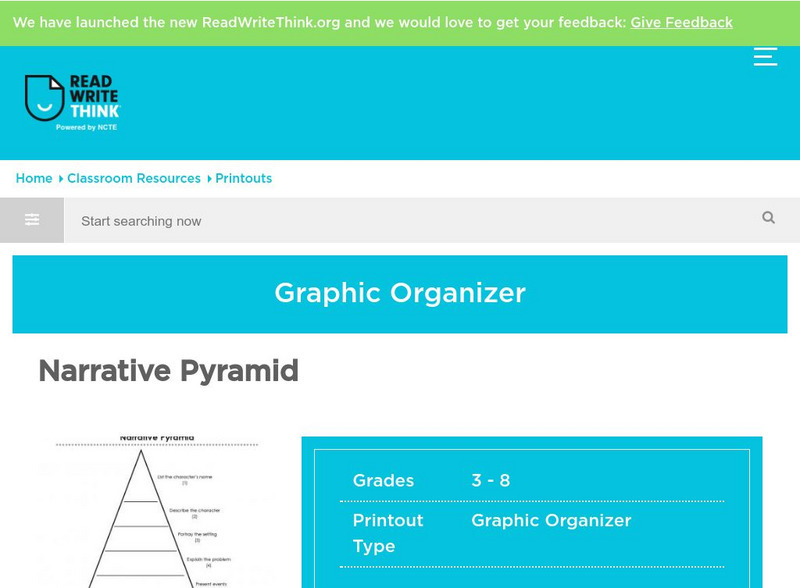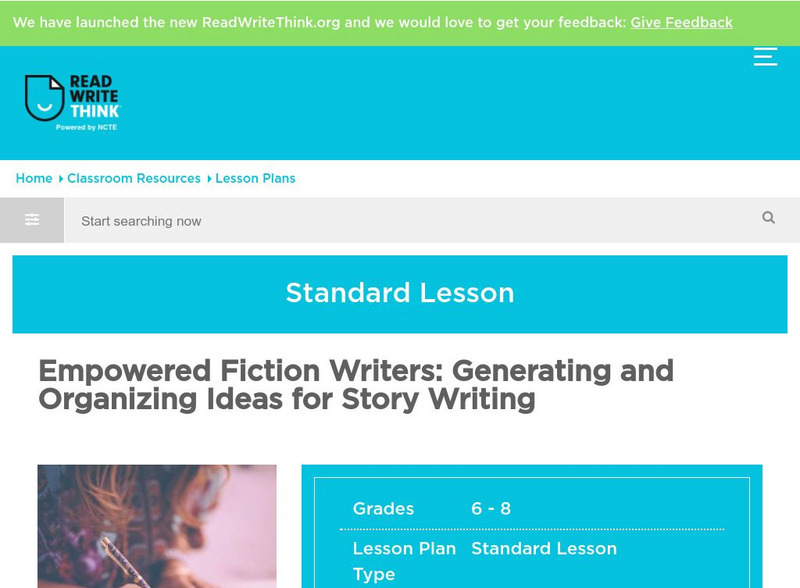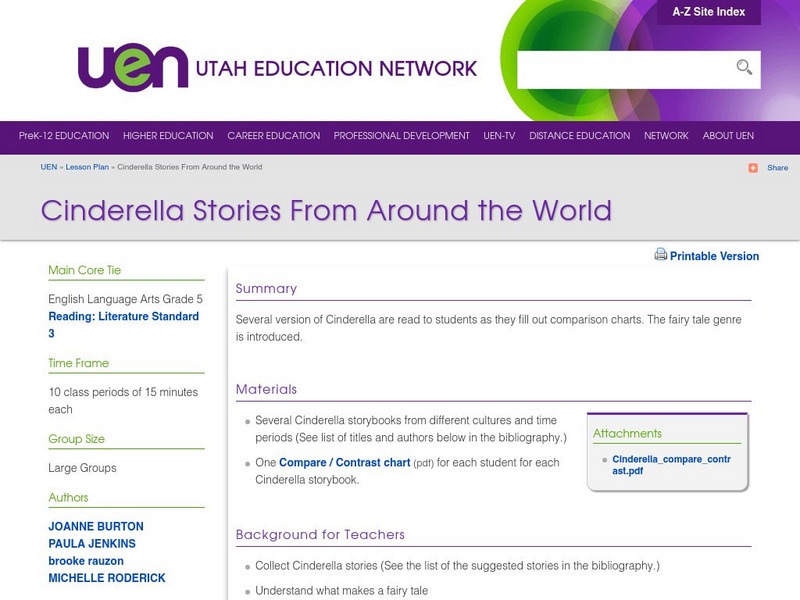Hi, what do you want to do?
Curated OER
The Legend of the Indian Paintbrush: Native American Life
Students read," The Legend of the Indian Paintbrush" by Tomie dePaola and discuss the way legends are passed down orally. They then create their own legend and illustrate it on a simulated "Buffalo Skin" made from brown paper.
Curated OER
Using Story Structure to Enhance Comprehension
In these story structure worksheets, young scholars review story structure and learn how to use story maps to help with their reading comprehension. Students review an example story map and then study three different graphic organizer...
Curated OER
Dancing Feathers
Fifth graders read and analyze the novel, 'Dancing Feathers.' They identify the main story elements, develop personal and fictional narratives, retell the story from a different point of view, create a mask, and design a postcard.
Curated OER
Transforming Negatives to Positives
Students write diamonte poems that correspond to the double-exposed photograph they created. In this poetry and multimedia artwork lesson, students use the photographic process to create a double-exposed photo then create...
Curated OER
Character Traits: Yang the Youngest and His Terrible Ear
Lensey Namioka’s Yang the Youngest and His Terrible Ear provides an opportunity for young readers to observe how writers bring their characters to life. Each class member selects a character to trace through the novel, recording...
Curated OER
Journal Writing
Learners gain a better understanding of good journal writing. They examine how there are two types of journals - personal and public, yet each serves to describe the writers feelings and experiences about a given event.
Curated OER
Double Exposed Photographs
Students create double-exposed photographs, poetry, and multimedia presentations. In this artwork lesson plan, students explore cameras, poems, and other art forms to understand line, light, and other attributes that contribute to artwork.
Curated OER
The Necklace Of Teeth Comic Strip
Students create a comic strip which identifies the major events in a story of the teacher's choosing in this upper-elementary classroom language arts lesson. The lesson is highly adaptable and can be used in another content area if...
Curated OER
Transforming Negatives to Positives
Pupils create double-exposed photographs, poetry, and multimedia presentations to celebrate their Open Court "City Wildlife" unit.
Curated OER
YANG AND THE YOUNGEST AND HIS TERRIBLE EAR
Students perform a web scavenger hunt to find information about the author of the book, YANG THE YOUNGEST AND HIS TERRIBLE EAR. They develop an understanding of how writers use personal experience to add voice to their writing.
Curated OER
Tall Tales
Students are provided with an opportunity to explore not only the interface but also the variety of scenery and objects available on the program. Younger students may require additional teacher assistance during the computer activity.
Curated OER
Rainforest Resources
Students explore products of the rainforest. In this environmental stewardship instructional activity, students discover the resources that the rainforest holds and examine products from the rainforest used around the world.
ReadWriteThink
Read Write Think: Comics in the Classroom: Introduction to Narrative Structure
Contains plans for four lessons that teach learners about narrative plot structures by using "The Three Little Pigs" fairy tale or a similar story. In addition to objectives and standards, this instructional plan contains links to sites...
ReadWriteThink
Read Write Think: Narrative Pyramid
A printable narrative pyramid where students can record information about a story including the character, setting, problem, main events, and solution. Directions on how to use this type of graphic organize as well as lists of teaching...
Florida Center for Reading Research
Florida Center for Reading Research: Narrative Text Structure: Summary Step Up [Pdf]
A lesson plan in which students read a narrative text and complete a graphic organizer to show the plot elements of the story. Materials are included.
ReadWriteThink
Read Write Think: Empowered Fiction Writers: Generating and Organizing Ideas
Do your students' minds go blank when they confront a blank piece of paper? Speedwriting can help them get started with writing as well as come up with topics to write about. They can then incorporate their key ideas and phrases into a...
Quia
Quia: Narrative Structure Elements
This reading resource provides vocabulary words with definitions. All words are related to the elements of narratives. A link to associated review activities is included.
ReadWriteThink
Read Write Think: Planning Story Characters Using Interactive Trading Cards
Young scholars use trading cards to examine fictional characters in a story.
Utah Education Network
Uen: Cinderella Stories From Around the World
In this lesson plan, 5th graders will compare and contrast different versions of the fairy tale "Cinderella." Students will use a compare and contrast chart chart. After the shared readings, students will use all the elements of a fairy...



















![Florida Center for Reading Research: Narrative Text Structure: Summary Step Up [Pdf] Lesson Plan Florida Center for Reading Research: Narrative Text Structure: Summary Step Up [Pdf] Lesson Plan](https://content.lessonplanet.com/knovation/original/509116-c9c6546ed67fc47f39cd0cad4fb48ffa.jpg?1661786948)



